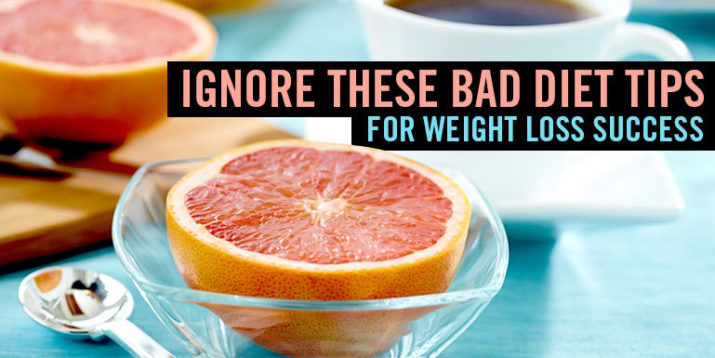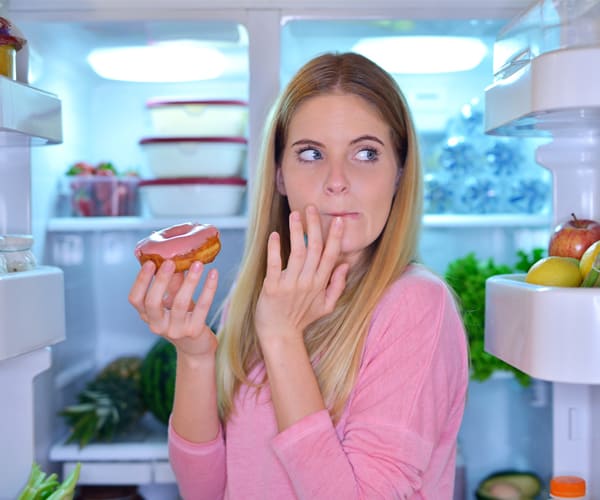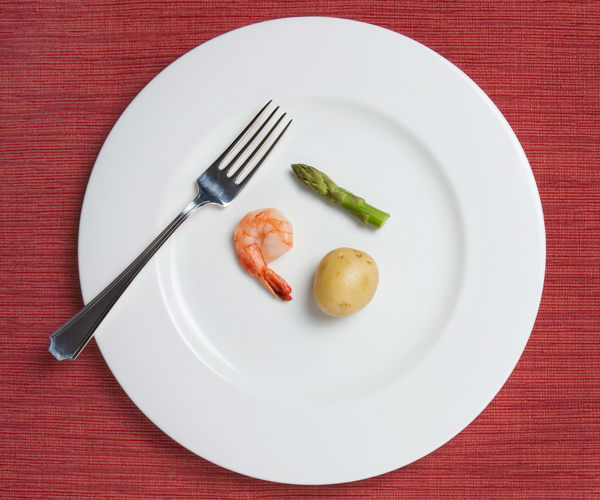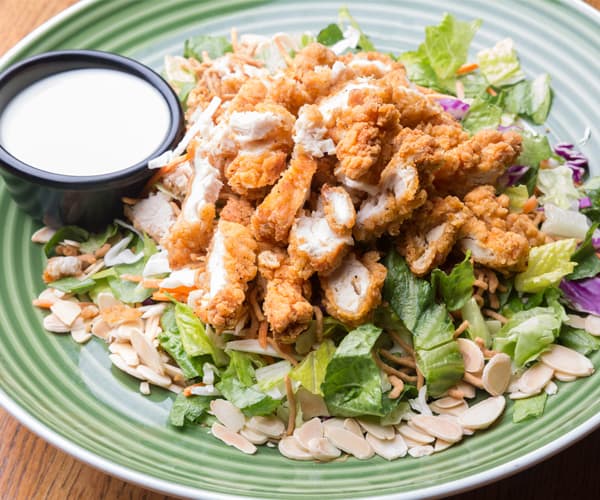Ignore These Bad Diet Tips for Weight-Loss Success

If you’ve ever tried to lose a few pounds, you’ve probably been inundated with diet tips. But take them all with a grain of salt — some advice may sound legit, but can actually derail your hopes for long-term weight loss success (and maintenance).
Before we start debunking the plethora of bad diet tips out there, let’s define what an unhealthy diet means. It not only includes eating an excess of refined carbohydrates, saturated fats, processed foods, sugar, and salt in excessive amounts, but it also de-emphasizes or excludes vegetables and fruits, an appropriate balance of macronutrients (carbs, protein, and fat) eaten mostly from whole-food sources, fiber, and water.
The real reason to avoid long-term diet and nutrition plans that don’t focus on real, whole foods and water consumed in the right-for-you amounts: Bad diet plans fail because they don’t teach you how to change unhealthy behaviors for good.
You wouldn’t intentionally take your car to a shady repair shop to replace your brakes, would you? Similar thinking should be applied to how you care for the one and only body you have. Here are the biggest, baddest diet tips you don’t want to follow.
Choose fat-free or sugar-free foods
Don’t believe this hype — if it isn’t outmoded in your mind by now, strike it from your thoughts. “They usually use fat and sodium to replace sugar, and sugar to replace fat — or chemicals to replace both,” says Denis Faye, Beachbody’s senior director of nutrition content. And Rania Batayneh, M.P.H., a nutritionist and author of the upcoming book, The 1:1:1 Diet, adds, “Removing fat from a food makes it less satiating, so you ultimately may end up eating more.” Stick with the original versions, and watch your portions, or, better yet, eat more unprocessed foods.
Cut all carbs, fats, gluten, etc., to drop pounds quickly

Don’t believe this hype, either. Sure, stories abound of celebrities who dropped pounds quickly by eliminating all gluten or dairy from their diets, or your next-door neighbor with three kids raves about how the low-carb lifestyle gave her a defined waistline again. Dig a little deeper, and follow up on how long these weight-loss results lasted. Did those who followed these diet plans end up going back to their old habits because the quick fix wasn’t sustainable, and eventually gain the weight back?
A randomized clinical trial published in the New England Journal of Medicine concluded that the most successful diet plans, regardless of whether they were low-fat, low-carb, or high-protein, can emphasize a variety of macronutrient compositions and lead to weight loss. The key to long-term weight-loss success were ones that were tailored to the trial participants’ personal and cultural preferences.
No cheating, ever
Relax your diet rules, and you’ll be more likely to stick it out long term. “If 80 percent of your diet is tight, then 20 percent can be a party,” Faye says. “It keeps you from getting stressed — and stress is a huge obstacle in weight loss.” Just plan your splurges ahead of time so you’re not giving in to every temptation that crosses your plate. (We see you, 21 Day Fixers who save your yellows for wine.)
Don’t snack
Healthy snacks eaten in correct portions can enhance your diet plan, keep you from getting too hungry between slightly larger meals, and make your plan feel less rigid (yay! You can eat something between meals like all of the other non-dieters you know.). Choose snacks that offer a balance of protein, fiber, and healthy fats, such as apples with peanut butter, carrots with hummus, or a smoothie made with Shakeology. Just make sure you’re keeping an eye on how your snacks fit into your total consumption plan for each day. Most Beachbody nutrition plans encourage healthy snacks as part of a balanced diet, and the accompanying Portion Fix Containers make it easy to stick to your ideal calorie range.
“A healthy snack can help you maintain steady blood sugar levels, which keeps your appetite in check and your energy stable,” Batayneh says. Skipping a snack can cause your blood sugar to dip, leaving you moody and famished — and more likely to overeat at mealtime.
Eat six smaller meals a day. And don’t eat after 8 p.m.

Some diet plans require that you rigidly prioritize your eating around a schedule in a way that doesn’t account for whether you’re actually hungry when it’s time to dine, or what to do when you’re legitimately hungry and it’s not time to eat. When you do this, you rob yourself of the educational process of learning (or re-learning) your body’s hunger cues.
Sure, you don’t want to eat an enormous meal right before bedtime for several reasons, most of which center around how this practice can disrupt your circadian rhythms, but you can eat a healthy snack if you’re hungry before going to bed. Try a small handful of mixed nuts, a small bag of popcorn, or some sliced veggies and hummus. If you’re trying to build muscle and/or exercising regularly, a dose of casein protein — part of the protein blend in Beachbody Performance Recharge — before bed can be beneficial for recovery and muscle synthesis.
Don’t eat fruit— it’s full of sugar
Let fruit satisfy your sweet tooth. “Yes, fresh produce is full of sugar and carbs,” Faye says. “But sugar itself is not the enemy. Fruit is packed with vitamins, minerals, and phytochemicals; it’s also rich in fiber, which slows the absorption of sugar. I’ve never met a human being who got fat because of bananas.”
When you’re craving sugar, there’s no debate that a handful of grapes is healthier than a hot fudge sundae.
If it’s organic, it’s good for you
According to the USDA, organic food is produced without antibiotics, growth hormones, conventional pesticides, and synthetic ingredients. The problem is that people may assume organic foods are low in calories, too, which isn’t necessarily true. Don’t get us wrong — we’d rather eat food that doesn’t resemble a science experiment. But, Faye cautions, “You need to use common sense. If it’s bad for you with conventional ingredients, it’s still bad for you when it’s organic.” A cookie is a cookie, no matter how all-natural it is.
Calories in, calories out. It doesn’t matter what you eat
What you eat matters. A lot. Compare a 100-calorie candy bar to 100 calories of avocado — the latter is packed with nutrients, and has healthy fats and fiber to keep you full. Or compare 50 calories of spinach (about seven cups) to 50 calories of ice cream (about two tablespoons).
To feel full when you’re cutting calories, look for foods loaded with water and fiber, like veggies or broth-based soups. Plus, “Hormones have a huge impact on our health. Junk food can trigger bad hormonal responses that, over time, can lead to all kinds of problems, including weight gain,” Faye says.
Occasionally, someone will pop up in the news claiming they lost a ton of weight while eating nothing but Subway, Starbucks, or Twinkies, but don’t put too much stock in those success stories. “When you go that route, you’re not educating yourself,” Faye says. “It’s like the teach-a-man-to-fish adage. If you give someone a gimmicky diet, she might lose weight for now; but provide her with knowledge, and she can be healthy for life.”
Try the Paleo, gluten-free, Atkins, cabbage soup, etc. diet
Find a plan that works for you. Gender, age, genetics, metabolism, and lifestyle can all play a role in weight loss — so even if a fad diet has worked for others, that doesn’t mean you’ll get the same results. “There’s no single diet that works for everyone; our biochemical needs are different,” Faye says.
Beachbody nutrition plans provide a broad view of clean eating in a way that takes the guesswork out of picking healthy foods, eating appropriate portions, and sticking to a calorie range that supports your weight-loss efforts and fitness gains. But, if you’re still struggling, talk to a registered dietitian to discuss individual specifics.
When in doubt, order the salad

You know this isn’t a picture of a healthy salad, right?
Choose your greens wisely. Leafy greens and vegetables may be virtuous, but not if they’re slathered in creamy dressing and topped with bacon, candied nuts, croutons, deli meats, or cheese. “Fatty fixings can add hundreds of calories to your meal, and sometimes contain more calories than that juicy burger!” Batayneh says. Salad can be a healthy choice, but order dressing on the side and limit the add-ons.
The Portion Fix orange container was designed to help you keep the amount of salad dressing or oils you use in check, and the Portion Fix blue container can help keep salad toppings, such as nuts, seeds, and cheese, aligned with your daily calorie goals. No, we’re not suggesting that you whip out your colored containers at a restaurant, stuff the food you want inside the appropriate container, then dump that back on your plate before you date returns from the bathroom, but practicing with the containers at home will turn you into a portion control pro in no time. You’ll start to learn how to eyeball what fits into your plan pretty quickly.
Don’t exercise; it’ll only make you hungrier
Get moving; daily activity will only enhance your health. Also, an hour-long workout shouldn’t make you want to suck down calories like Michael Phelps. “Exercise isn’t just for losing weight. It improves your cardiovascular health and strengthens your bones,” Faye says.
You might feel hungrier while recovering from a grueling workout, but that doesn’t mean you’re going to pack on pounds. “As long as you’re eating clean, your body is amazing at self-regulating,” Faye adds. “It should crave the calories you need to fuel your workouts, not to get fat.”
You can reward yourself with junk food
Rethink your reward system. After an intense workout, you may feel like you’ve earned a cocktail or cupcake. But splurging after every workout can quickly undo all your hard work. If you’ve been good all week, go ahead and grab a guilt-free beer on Friday. But, Faye says, “Don’t let every workout become a Pavlovian thing where you need to eat cake afterwards.” After all, the best reward for a killer workout is getting one step closer to the body you want.
The 10-Second Takeaway
The worst diets are the ones that don’t truly improve your eating habits and overall health, and that you can’t stick to for the long haul. To assess whether a diet plan will work for you, picture yourself three months, then six months, then one year from now. Do you see a healthier, fit, and more vibrant version of yourself? Do you think you’ll be able to follow the plan for that long and beyond, considering all of the ups and downs of life, the celebrations and holidays, travel, and vacations? If the answer is no, then you’re not setting yourself up for weight-loss success.
